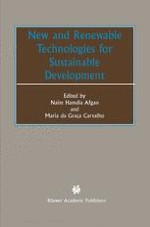2002 | OriginalPaper | Chapter
Expert System for New and Renewable Energies
Authors : Fabio Orecchini, Riccardo Del Po, Vincenzo Naso
Published in: New and Renewable Technologies for Sustainable Development
Publisher: Springer US
Included in: Professional Book Archive
Activate our intelligent search to find suitable subject content or patents.
Select sections of text to find matching patents with Artificial Intelligence. powered by
Select sections of text to find additional relevant content using AI-assisted search. powered by
In an energy market where the energy networks reach almost all the sites, as the European one, the continuity of the required energy supply is perceived as a “must” from the end users. The number and the temporal extension of any “black out” along the year is regarded as a qualifying parameter to evaluate the performance of each Utility. As a matter of fact a renewable energy source, like solar energy or wind, isn’t every time available at the same level along the day and/or the year, so an expensive backup system has to be foreseen to allow them to be competitive. If systems that exploit renewables are linked to an existing grid, as the electric one, or share the same equipment to produce usable energy (as a boiler that can burn either gas or biomass) they become integrated systems, and the renewables can be exploited when and where they are available. Thank to the synergy among renewable-based energy systems and the conventional ones, the energy markets can take advantage of the naturally existing diversity. This diversity arises both from the integration of a range of technologies, each with its own temporal variations (“when”), and from naturally geographical diversity of the resources (“where”). The development of an analysis about the possibility to integrate renewable based energy systems, requires a global evaluation of the interaction among the proposed technological choices, economical aspects and social effects assume a relevant role. The high number of independent variables that has to be considered and the difficulty of modelling some entities and their relationships bring this type of problem in the field of the “complex problems”, that can managed only by skilled people. Usually, many actors are called to work in planning the features of an energy system, as decision makers, politics of local or central administrative bodies, utility executives, etc., but is not assured that the involved people are totally able to master these activities. Since the potential request (and so the potential market) for tools that can support the decision process in this framework appears as interesting, a Decision Support System (DSS) is under development at CIRPS — University of Rome “La Sapienza” aimed at helping to assess the possibility to integrate renewable energy based plants within the energy system of a European Region. The goal of the project is to design an expert system that could help the user in the evaluation of the potential for an integration of renewable energy sources within selected European Regions, in the assessment of the impacts of their exploitation and in supporting the choice among different possibilities. This paper presents an overview of the activities related to the development of the tool, highlights the baseline of the project, the desired targets versus the acquired ones, the main difficulties encountered and the actions performed to overcome them. The aim is to analyse, through the experience gained, the opportunities to use expert systems and expert system based tools in energy planning.
